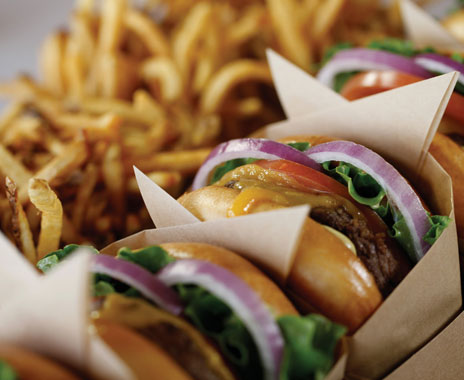Todd Coerver heads to his new corporate digs in Denver and joins five other co-workers each day. Even for a brand that toasted its 10th anniversary on December 9, it’s fair to say Larkburger remains a fast casual with a start-up vibe.
But things are changing. Coerver, who was named Larkburger’s CEO in September, spent the past six years with 170-plus unit Taco Cabana. Before that, he was the vice president of marketing and innovation at Whataburger. When he arrived at Larkburger, it was Coerver’s big-pond experience that the brand was counting on.
In 2017, the better-burger concept, which was started by Chef Thomas Salamunuovich a decade ago, is leaving The Centennial State for the first time, opening a unit in Kansas’ Overland Park, the home of Sprint. This is really just the beginning of what Coerver says will be parallel growth throughout Larkburger’s home state and the Kansas City market. He expects expansion to ramp up over time, with two to three new units in 2017 and five in 2018. After that? It will come down to growing Larkburger “as fast as we can replicate the magic,” Coerver says.
“If you’re not careful, the brand can get away from you,” he says. “There’s a long list of brands out there that have experienced that. When you embark on explosive growth it’s easy to lose yourself along the way, and we want to be sure that doesn’t happen to this very special company. It is going to be a slow and steady approach to begin with.”
Larkburger’s expansion will be strictly company-owned. The reason being that the 12-unit chain doesn’t want to compromise its DNA. Larkburger makes all of its sauces and dressings in-house. There are no preservatives or additives. Fries are hand-cut and cooked in trans fat-free canola oil. That same oil is reused to power cars. Utensils are made from potato and corn starch. Even the energy, which is 100 percent wind-produced, is natural.
Thanks to these traits, Larkburger is not “the easiest place to work,” Coerver says. Not that it’s unpleasant, but that the concept is far from a drop-and-repeat fast casual.
“It’s a fairly complicated operation in the back of the house to deliver that culinary-driven approach,” he says. “So we do want to keep close control over the operational quality from restaurant to restaurant. … We really take a lot of pride in our culinary approach. We don’t want the easy way.”
From day one, Coerver immersed himself in the culture. He spent the first 30 days on what he refers to as a listening tour, chatting with everybody from board members to brand partners. “I wanted to make sure I understood and fully appreciated all the nuance around this brand, so I knew what I would be in charge of upholding,” he says.
The company pride was quickly apparent, and deepened Coerver’s sense of obligation. As Larkburger grows, maintaining a firm grip on that ethos has never been more important.
Larkburger began in earnest in 1999 when Chef Salamunuovich menued the “Larkburger” at fine-dining Larkspur Restaurant in Vail, Colorado. Seven years later, he decided to build a limited-service concept around the gourmet burger. The restaurant would be constructed with reused wood paneling and feature food choices like Chopped Kale Salads and Truffle Burgers.
In those first 10 years, the chain reports it sold 7,296,781 burgers, 163,000 beers, 883,666 milkshakes, and saved 1,063 tons of waste from the landfill via their composting program. The wind program has had the equivalent effect of removing 1,067 cars from the road for a single year.
Needless to say, Coerver understood Larkburger’s path forward wasn’t going to be a typical one. “We know what we’re doing is different and is special compared to the rest of the fast casual category,” he says. “I want to make sure we bottle and protect that.”
That’s going to start within, he says. Currently, Larkburger has around 250 employees, measured out at around 20 per restaurant. At the corporate level, expect those six employees to feel rather crowded in the near future.
“We’re bringing in the right talent and leadership into the fold here to help us grow thoughtfully and carefully,” he says. “That’s going to be a big focus the next 24 months. How we build out the team here at the home office is going to guide that growth and the systems and processes and discipline that we will put in place to make sure we grow responsibly.”
How Larkburger plans to expand will largely be defined by its audience, which Coerver explains as being “very defined in terms of demographics.” They are targeting areas with fairly high household incomes. “They’re educated. They have disposable income. They’re not as much driven by price as they are driven by quality food and a brand with a social conscious. These are things that matter to our target audience,” he says.
Regardless of how this footprint unfolds, Coerver says the feeling at Larkburger is one of excitement and untapped potential. “We’re going to need a bigger office soon,” he says with a laugh. “There’s no question about that.”

